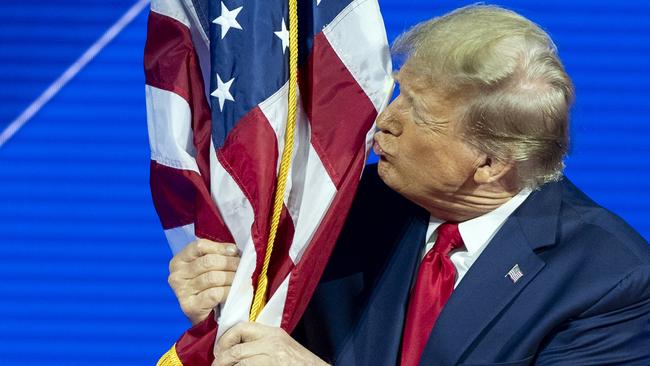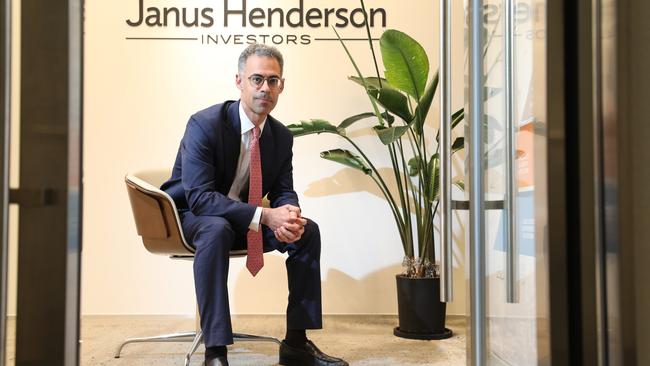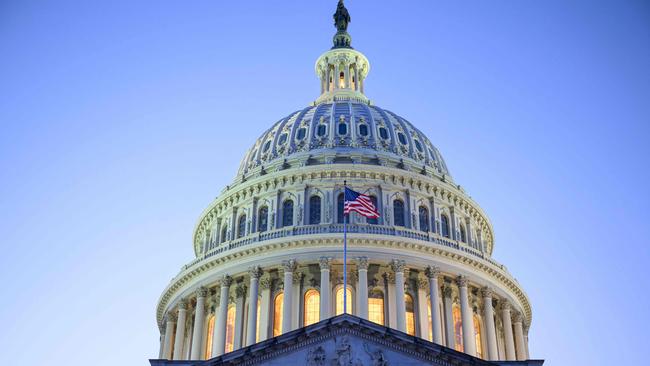Trump’s election brings on a new era of uncertainty, Janus Henderson’s chief says
The election of Donald Trump and geopolitical volatility globally make it a scary time for people trying to manage their wealth and prepare for their retirement, says Janus Henderson’s Ali Dibadj.

Investors face a “scary time” amid uncertainty created by the election of Donald Trump and geopolitical tensions around the world, and should expect a permanent return to higher interest rates, the chief executive of global fund manage Janus Henderson, says.
In an interview with The Australian, Ali Dibadj, whose firm manages more than $US382bn ($550bn) in global assets, said 2024 had seen elections in many countries around the world including the recent re-election of former US president Donald Trump.
“The world is much more complex,” he said. “There is clear geopolitical volatility in the market. It’s not just the US which has had an election. There is geopolitical change around the world.
“It is too early to tell what it all actually means and what decisions will be made in the US.
“There is a lot of complexity right now: there are a lot of unknowns. It’s a scary time for people who are trying to manage their wealth and prepare for their retirement.”
Mr Dibadj, who is based in the US, said it was not possible to tell at the moment how the relationship between the US and China would play out under a Trump administration, with the president-elect threatening tariffs of up to 60 per cent on goods from China and making threats this week about imposing tariffs on Canada and Mexico.
“(China and the US) are two very strong powers who have enormous economic relationships with each other,” he said.
“Time will tell how the new US administration acts. Over time, it’s in the best interests of everybody if the two superpowers collaborate going forward.
“I don’t know what will happen in the short term, but over the long term hopefully rationality will prevail, and the economy will be doing better for both players.”

Mr Dibadj said investors would need to get used to a higher level of interest rates which had been the norm before the global financial crisis of 2008.
He said the long period of low interest rates which followed the global financial crisis of 2008 – and was exacerbated by monetary stimulus in reaction to Covid-19 – had allowed many companies to be successful including those that were badly run.
He said the return to a regime of higher interest rates meant poorly run companies would suffer – a lesson which investors had to learn.
“There was no cost of capital (in the past) and that has changed,” Mr Dibadj said.
“Even as rates are coming down, they are unlikely to be going back to this regime where there was no cost of capital.
“People have asked me: ‘It this a new normal?’ My answer is: ‘No. This is the old normal’.”
He said Janus Henderson was having to coach its clients to be prepared to operate in a new era of higher interest rates. “People who are under 35 have never seen anything like interest rates at these levels. They think something’s wrong, but this is the way the world has been for decades.”
Mr Dibadj, who was speaking on his third visit to Australia in the last 2½ years, said he was concerned what the higher interest rate regime would mean for private equity, which had been able to raise funds cheaply in the past.
“I worry a lot about what is happening in the private equity realm right now,” he said.
“People have been borrowing at low interest rates for a very long time. Now, all of a sudden, people are having to refinance at much higher interest rates – not only their mortgages but their investments and their company.”
He said investing would also be made more challenging because of demographic changes including the ageing population and the fact that the world population growth was slowing and could eventually hit a peak.

This would have implications for assessing companies as they grappled with the slowing of population growth and, at some point, having fewer people in the world. Investors wanting to make long term investments in a company would have to take into consideration population trends.
“Population growth will not happen anymore at the same pace, so you have to rethink what a company is worth,” he said.
“A company which looked attractive five years ago may not be as attractive in 20 years time. And we are long-term investors.”
Mr Dibadj said Janus Henderson – which has been in Australia in its current form since 2013 and now has 80 staff across Sydney, Melbourne and Brisbane, with $30bn in assets under management locally – was keen to expand its local business.
The Australian business is focused on institutional clients and selling its products, which include equity and fixed interest investments through financial advisers.
He said the local business had “a lot of tailwinds” given the mandatory investment in superannuation as well as Janus Henderson’s established reputation in the local market.
“We feel very good about how we look competitively compared to other asset managers both locally and globally,” he said.
The company has its roots in the Henderson Group which was once owned by AMP.
AMP bought the London-based group in 1998, integrating it with AMP Asset Management. In 2003 it demerged Henderson and relisted it as HHG Group, selling its remaining 15 per cent stake in the company in 2005.
Henderson reopened its doors in Australia in 2013 after a decade out of the local market.
In 2017 the Henderson merged with the Janus Capital to form Janus Henderson.
Mr Dibadj also said Australian investors needed to become more courageous about investing offshore to diversify their investments, given geopolitical issues and global uncertainty.
“This not a uniquely Australian ailment,” he said. “We see it in the UK, in Canada and even in the US. Most people are not globally diversified enough (in their investments).”
While the US had been one of the strongest markets globally in recent years, outperforming many other markets including Australia, he said there were many other opportunities in other markets around the world.
He said the Indian market had outperformed most other markets recently. There were also investment opportunities with companies in Europe and other markets such as Mexico.
“There is an increased level of complexity for investors,” he said.
“You can’t just make a blanket statement about any region. You have to be prepared to go deeper to look at opportunities around the world. That’s what we (at Janus Henderson) do for a living.”




To join the conversation, please log in. Don't have an account? Register
Join the conversation, you are commenting as Logout